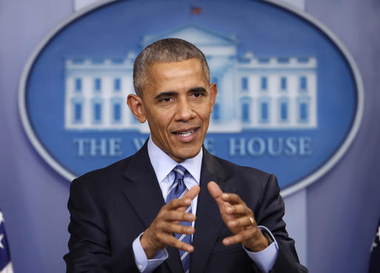The Latest: Senators say they'll push for stronger sanctions

WASHINGTON (AP) — The Latest on the Obama administration's response to Russia's interference in the U.S. elections, which it denies (all times EST):
4:15 p.m.
Republican Sens. John McCain and Lindsey Graham say sanctions against Russia announced by the Obama administration on Thursday are "a small price" for Russia to pay for interfering with U.S. elections. They say they'll lead efforts in Congress to impose stronger sanctions.
McCain, of Arizona, and Graham, of South Carolina, called Russian cyberattacks on the 2016 election a "brazen attack on American democracy" and say retaliation measures announced Thursday by Obama are long overdue.
Russian officials have denied the Obama administration's accusation that the Russian government was involved at the highest levels in trying to influence the U.S. presidential election. U.S. intelligence agencies concluded that Russia's goal was to help Donald Trump win — an assessment Trump has dismissed as ridiculous.
Obama's move puts the president-elect in the position of having to decide whether to roll back the measures once in office.
___
4 p.m.
The spokesman for President Vladimir Putin says Moscow regrets the new sanctions that the Obama administration imposed on Russia on Thursday and is considering retaliatory steps.
Dmitry Peskov told reporters on Thursday that the measures signal Obama's "unpredictable" and "aggressive foreign policy."
Peskov says "Such steps of the U.S. administration that has three weeks left to work are aimed at two things: to further harm Russian-American ties, which are at a low point as it is, as well as, obviously, deal a blow on the foreign policy plans of the incoming administration of the president-elect."
President Barack Obama on Thursday imposed sanctions on Russian officials and intelligence services in retaliation for Russia's hacking of American political sites and email accounts ahead of the November election. Peskov on Thursday reiterated that Russia was not involved in the hacking.
Peskov said Putin has yet to study what the new sanctions involve and work out what retaliatory steps could be.
___
3:45 p.m.
The foreign affairs committee chairman of the Russian parliament's upper chamber says Russia will see what President-elect Donald Trump has to say about U.S. sanctions announced on Thursday before stating retaliatory measures of its own.
Konstantin Kosachev tells the Interfax news agency that Russia "needs to consider the circumstances of the transition period and a possible reaction of the U.S. president-elect."
The Obama administration announced the new sanctions, expulsion of 35 Russian diplomats and closing of two Russian compounds in reaction to Russia's interference in November's election. Russia denies the accusation.
___
3:35 p.m.
House Speaker Paul Ryan says the Obama administration's new sanctions against Russia are long overdue after eight years of "failed policy" with Russia.
The Wisconsin Republican said in a statement Thursday that "Russia does not share America's interests" and has consistently sought to undermine U.S. values while "sowing dangerous instability around the world."
Ryan says the sanctions announced Thursday were overdue, but were "an appropriate way to end eight years of failed policy with Russia."
He said Russia's interference in U.S. elections showed the Obama administration's "ineffective foreign policy that has left America weaker in the eyes of the world."
The Obama administration announced sanctions in response to Russia hacking the U.S. elections. Russia denies the accusation.
___
2:30 p.m.
President Barack Obama has imposed sanctions on Russian officials and intelligence services in retaliation for Russia's interference in the U.S. presidential election by hacking American political sites and email accounts.
The State Department also has kicked out 35 Russian diplomats from its embassy in Washington and consulate in San Francisco, giving them and their families 72 hours to leave the U.S. The diplomats were declared persona non grata for acting in a "manner inconsistent with their diplomatic status."
Obama said Russians will no longer have access to two Russian government-owned compounds in the United States, in Maryland and in New York.
Russian officials have denied the Obama administration's accusation that the Russian government was trying to influence the U.S. presidential election.
U.S. intelligence agencies concluded that Russia's goal was to help Donald Trump win — an assessment Trump has dismissed as ridiculous.
_
Copyright 2016 The Gayly - 12/29/2016 @ 3:19 p.m.





